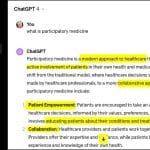There are two sets of Meaningful Use draft regulations out for comment at present: (1) Proposed revisions to Meaningful Use Stage 2 (“MU2”), with comments due June 15 and (2) Proposed Meaningful Use Stage 3 (“MU3”) regulations, to be effective in 2017 at the earliest. The Society for Participatory Medicine has filed comments on both of these. (See the discussion, and links to the comment letters, below. See further discussion of MU2 and #NoMUwithoutMe last month on e-patients.net. There’s more info on the S4PM #NoMUwithoutMe resource page.)
We urge everyone reading this post who cares about empowering patients through better engagement with the health care system to file comments as well. In order to expedite this process, you can copy and edit the Society’s comments found here: MU2 and MU3, and then just paste them into the appropriate comment web pages. Each document includes at the top a link and instructions for submitting comments online directly to the federales. Easy peasy.
Numbers matter — but the only numbers that matter in cases like these are the numbers of comments filed through official channels. Tell your friends and neighbors. And do it now. The deadline for comments on MU3 is May 29, 2015, 11:59 pm ET. The MU2 comments are due a couple weeks later, but please file them at the same time as your MU3 comments. (You can also add your name to the National Partnership for Women and Families’ MU2 comment letter before June 12.)
The MU2 regs have captured the attention of many because they propose a revision to the patient engagement measure, reducing the threshold for compliance from requiring that 5% of patients seen by a provider in the attestation period view, download or transmit (“VDT”) his or her health data, to requiring that ONE PATIENT VDT.
The Society for Participatory Medicine filed a strongly-worded comment letter today opposing the proposed change to MU2.
The MU3 regs are even more important, because they are going to form the basis of the “permanent” MU regulations going forward. Even after the MU incentive dollars run out, CMS will continue to require compliance with these requirements as a threshold matter for other program purposes. Of course, they may be tweaked in the future; but the initial form of the permanent regs is very important.
The MU3 regs broaden the notion of patient engagement into a measure with multiple options. To get credit for this measure, a provider must attest as to all three, but must hit the thresholds for at least two:
- 25% of patients VDT health information
a. via portal; or
b. via APIs - Secure message sent to 35% of patients
- Incorporating data obtained in a non-clinical setting and transmitted to the EHR for 15% of patients.
There are exceptions for rural providers (due to lack of broadband) and the definition of “non-clinical setting” includes all clinicians and health care facilities that are not participating in Meaningful Use, thus ensuring that no provider will bother to work on integrating patient-generated health data (“PGHD”), which is a key portion of what this provision was supposed to be about.
The Society for Participatory Medicine filed another comment letter today on MU3, supporting the future strengthening of patient engagement, as follows:
- Supporting the increased threshold for VDT/API access. (I am concerned that since the “one patient” proposal for MU2 was published after the MU3 proposal, that the physician lobby will propose that the 25% threshold be rolled back to “one patient” as well.)
- Opposing the rural provider carveout since patient access via APIs on smartphones is not broadband-dependent
- Supporting the secure messaging threshold
- Supporting the requirement that non-clinical data be transmitted for at least 15% of patients, and broadening the definition so that providers would have to both (a) incorporate PGHD into the EHRs of 15% of patients and (b) incorporate data sent by other providers not participating in Meaningful Use into the EHRs of 15% of patients.
(There is a set of certification standards for EHRs that was released the same day as the MU3 reg, but in keeping with the S4PM policy of remaining technology-agnostic, we have not delved into them. The proposed comments are purely focused on the patient engagement piece of Meaningful Use.)
Please add your voice to the public conversation about the importance of patient engagement through EHR-based tools — and please do so in the only way that the federales can take to heart officially: file written comments on MU2 and MU3 before May 29.
David Harlow is a health care lawyer and consultant at The Harlow Group LLC, and chairs the Society for Participatory Medicine’s public policy committee. Check out his home blog, HealthBlawg. You should follow him on Twitter: @healthblawg.






Thank you David for clarifying and making this easy for SPM members to support. To me this is critical to the future of healthcare and participatory medicine and we must all take just a few minutes to add our individual voices to this campaign.
Meaningful Use does not measure actual benefit to the patient population, rather it measures processes as a proxy for such benefits. It is not clear to me how the proxy is proveably a good representative or repeatable over large patient populations.
So the larger question, I’ll guess, is to whom is MU meaningful? I’d look for trends of improved outcomes and reduced adverse events, over time, if MU were to include time-dynamic rather than static measures.
I am fully supportive of the above comments, as patients will be hurt by the proposed changes in MU2. The proposed change will create additional barrier to patients as they learn about their own health as it limits access to that essential data. Meaningful Use guidelines must open access to more patients, recognizing that patients are the owners of their own data.
As to the MU3 changes, I would like to see all messaging be made available to patients, lest the high standard of “secured” messaging creates another barrier of access for patients.
Glen —
I agree — Meaningful Use measures are clearly process measures, not outcome measures.
There has been some work connecting these processes to improved outcomes and other system improvements (see, e.g., this RAND meta-analysis: http://www.healthit.gov/buzz-blog/electronic-health-and-medical-records/meaningful-use-healthit-improves-quality-safety-efficiency-outcomes/)
A couple highlights from the RAND study:
– 78% of health IT studies reported at least some positive effects on safety outcomes.
– More than 75% of studies of health IT alerts and reminders reported positive effects on quality of care.
– 85% of the studies on utilization found that the effects of health IT led to an appropriate increase or decrease in utilization.
I’d invite other readers to point us all to more of the available literature.
I submitted comments.